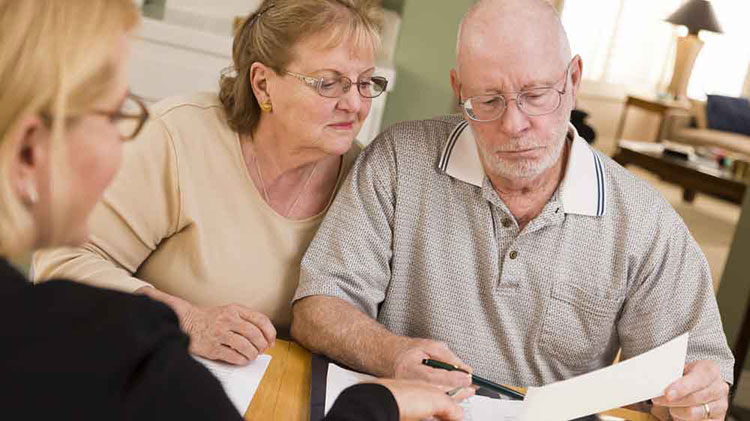Steps to take when a loved one dies
Often it's difficult to know what to do when a loved one dies. We offer some suggestions to help you through this challenging time.
Losing a loved one — whether unexpected or anticipated — is never an easy thing to deal with. The stress of not knowing what to do when a spouse dies or what to do when a parent dies can often be so overwhelming that it can leave you physically and emotionally exhausted.
While it's important to make sure some things are taken care of as soon as possible, it's also important to remember that it's OK to ask for help when dealing with the responsibilities that come after a loved one has passed.
What to do immediately following the passing of your loved one
- Get a legal pronouncement of death. A pronouncement of death includes the necessary information to prepare an official death certificate (which will be needed for dealing with financial matters like life insurance and assets). If your loved one was in a healthcare facility when they passed, the doctor or nurse in attendance will help record the details concerning the pronouncement of death. If your loved one was not in a healthcare facility when they passed, it's important that you call 911 immediately. A medical professional can assist you with the pronouncement of death and offer guidance on the next steps to take when someone dies.
- Notify friends and family and ask for help. Determining who to notify when someone dies can be a challenge. The best place to start is with friends and family. As you reach out to them, they can help identify additional names to add to your list and may even be willing to assist you in notifying them. This can lift some of the immediate burden off your shoulders.
- Find a loving home for any pets your loved one may have left behind. Friends and family are often very willing to help provide foster care for a pet, which can help lessen your stress as you sort through long-term plans.
- Ensure your loved one's home and personal property are secured and maintained. If your loved one lived alone, it's a good idea to make arrangements for someone you trust to keep an eye on their property and make sure routine maintenance is taken care of, such as getting the mail, watering plants, mowing the grass, etc.
- Notify the decedent's employer. If your loved one was still employed when they passed away, you'll need to call their employer to find out about any benefits they had, such as a pension or a life insurance policy. You can also use this call as an opportunity to notify coworkers and share the details of funeral arrangements.
- Take time to grieve. It's easy to get distracted when there is so much to do, but it's important to pause and let yourself mourn.
Make arrangements for funeral and burial plans
- Locate your loved one's will. Your loved one's will includes the name of their executor along with all the details regarding how they wish to have their assets distributed after their death. The executor handles all the financial matters of the deceased to settle their estate, including paying off debts and distributing their assets as specified in the will.
- Choose a funeral services provider. When it's time to make funeral arrangements, consider your options for which funeral, burial or cremation providers meet your service needs.
- Prepare your loved one's obituary. Take time to remember all of the joy your loved one brought to others. This will help you craft a meaningful and loving obituary that honors your loved one's life. Your funeral home director may be able to assist you with this process. Consider sharing the obituary on social media to reach extended family, friends and acquaintances.
What to do after funeral services have concluded
- Obtain copies of the death certificate. Typically, the funeral home will provide 10 copies of the death certificate — these will be needed to help facilitate the transfer of assets. If you are the executor, you will need to obtain an original death certificate to be used for probate court and other financial matters.
- Contact all parties named in the will. If you are the executor, you will be responsible for notifying all parties named in the will.
- Meet with a trust and/or estate attorney. If you are the executor, it is a good idea to hire a lawyer to help you distribute the assets properly; estates can often be overwhelming and complicated.
- File the will with the probate court. If you are the executor, it is your responsibility to file the will with the appropriate city or county probate court. This will ensure all debts and liabilities are paid and assets are transferred to the rightful beneficiaries.
- Close all financial accounts and take measures to protect any forms of identification. From the decedent's driver's license and voter registration to utilities and any subscriptions they might've had, cancel any services to prevent fraud and identity theft.
Settle finances
- Track down and inventory assets. Make a list of all assets and record their values. You'll want to include personal property, homes, cars, bank accounts, brokerage accounts, furniture, jewelry and more on your list. It might be a good idea to consider hiring an appraiser if your loved one had items of value such as collectibles.
- Organize financials. If you are the executor, you'll need to make sure your loved one's bills are paid. You should also notify the financial institutions your loved one had an account with to let them know they passed away.
- Gather information about life insurance coverage. If you are the executor and your loved one was still working when they passed away, you'll need to contact their employer to ask if they were covered under a group life insurance policy. You should also check to see if they had a personal life insurance policy. Start by reviewing the will and contacting their financial professional (if they had one). You could also contact the life insurance company directly.
- Notify important agencies. Contact the Social Security Administration, Medicaid and (if applicable) the U.S. Department of Veterans Affairs.
- File returns and pay taxes. If you are the executor, consider hiring a certified public accountant to make sure all tax returns are filed correctly on behalf of the deceased.
- Distribute all assets. Once claims and taxes are settled and paid, the executor can distribute assets to named heirs and beneficiaries.
Remember: Not all of these duties have to fall on one person; delegating tasks to family and close friends can help ease the burden and allow you time to reflect, mourn and appropriately grieve your loss.




